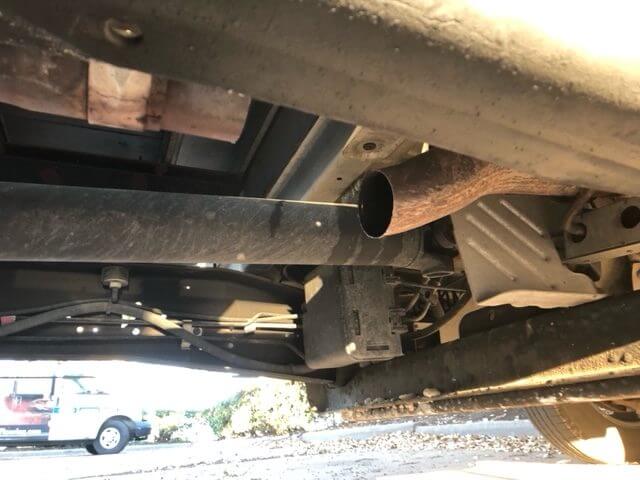
Thieves stealing parts for metal, APD reports uptick in crimes

By LESLEE BASSMAN, Four Points News
Two businesses owned by Four Points residents have been part of a recent uptick in local thefts of catalytic converters on company trucks. Repairs cost thousands of dollars and the vehicles are out of commission at a time when many small businesses are struggling.
Stephanie Landers — who co-owns Landers Premier Flooring at 2601 McHale Court, with her husband John — said she discovered a catalytic converter was stolen from her company’s truck after reopening the business on Jan. 4 following Christmas and New Year’s holiday closures. The Westminster Glen resident said the truck “made a horrible noise” when it was started up and dashboard lights began flashing indicating a problem with its catalytic converter.

“We took a look and saw that it had just been totally sawed right off,” Landers said of the catalytic converter, with the attached muffler also taken.
She called her insurance company as well as the Austin Police Department who told her “they didn’t think they’d be sending someone out” and that the incident “was fairly common,” Landers said. An APD officer took her information the next day and provided a case number marking the crime, she said.
The truck was towed and out of commission while Landers said she searched for an answer to protect the vehicle in the future.
“I guess, I feel fortunate (that) after 15 years, this is our first case,” she said. “It’s another sign of the times I guess.”
Landers said the initial quote to repair the truck was $3,000.
According to Austin Police Department Detective Jeff Sarrels, thefts of catalytic converters have been going on for a long time but the crime has recently spiked. A thief may only be paid $50 to $400 per catalytic converter on the resale market, depending on the type and quantity of metal contained in the part, he said.
River Place resident Shawn Olsen, who co-owns Skandinavia Contemporary Interiors in the Westgate Shopping Center, said two catalytic converters — one on each side of his business’s commercial truck — were stolen from the vehicle twice, costing $3,200 for repairs each time the parts were taken. He said his deductible was $1,000 per incident, money out of his pocket, with the remainder of the repair costs paid by insurance. The first theft occurred in November and, after the vehicle was repaired, Olsen drove it to a more secure location daily for about three weeks, adding an hour to his commute. He said the company’s other vehicles fit safely inside his warehouse.
During a break from that schedule, Olsen parked the same truck in its usual location when the second theft happened on Dec. 9, with one of his employees eyeing the perpetrator leaving the vehicle with its parts. When he called APD, he said he was told similar incidents have been happening “a lot.” He also said that he heard another furniture shop had their vehicles’ catalytic converters taken that same day.
“It’s a huge cost, it’s frustrating,” Olsen said. “At some point, my insurance company is going to say, ‘hey, we’re not paying for this.’ What insurance company is going to keep paying for the same problem?”
Catalytic converter thefts
According to APD Detective Sarrels, Prius, electric and hybrid vehicles are popular among catalytic converter thieves who resell the parts to buyers interested in the metals embedded inside, including rhodium and platinum. Although the metals deteriorate over time within the catalytic converters, they decompose slower inside of electric vehicles, he added, resulting in a higher yield to the criminal when he or she resells the part. Some higher end vehicles are in demand for their catalytic converters since they often use a better grade of material that’s worth more upon resale, he said.

“The big commercial box trucks really don’t have anything special about them other than they are just a larger unit so therefore they have more of that metal in there,” Sarrels said.
After the catalytic converter is stolen, the criminals will take the part to a recycling center where it is melted down and they are paid by the center, he said, adding that no recycling centers in Travis County currently accept catalytic converters.
“From a law enforcement standpoint, we’re having a number of issues with it,” Sarrels said of catching catalytic converter thieves. “It’s such a random crime and it happens so quickly.”
He said the incident occurs within minutes when thieves either jack up a smaller vehicle or climb under a larger vehicle, using a power saw to cut off the catalytic converter. To the person walking out to the vehicle, there’s no obvious signs that it has been tampered with until he or she starts it up, with the vehicle making a loud noise, Sarrels said.
Also, he said laws that would pertain to these types of actions haven’t kept pace with the crime since many of the metals contained in a catalytic converter fall outside of precious metal regulations. Recycling centers aren’t required to keep track of businesses that resell the catalytic converters, and, although some manufacturers put a serial number on catalytic converters, most car owners are not in possession of such a serial number and lack an easy way to find out what that number is, he said.
“The manufacturing plant that built your car is going to have it but good luck trying to figure out how to get that,” Sarrels said of the serial number.
Without a serial number, proving a catalytic converter was stolen is nearly impossible as rarely will the part be reported as missing and contain an identifying serial number to match up, he said. Thefts of catalytic converters are only prosecuted as Class A misdemeanor crimes and, due to COVID-19 concerns, Travis County isn’t accepting misdemeanors into jail, Sarrels said.
The cost to repair sedan-type vehicles with stolen catalytic converters may be $1,000-$1,600, he said.

Many types of property crimes have waves, such as porch thefts during the holiday season, catalytic converter losses don’t increase during a particular time of year, Sarrels said. However, over the past few months, those crimes have increased locally, he added.
Deterrents
Skandinavia Contemporary Interiors’ Olsen said he was faced with finding another method to safeguard his company’s vehicles. He found the answer online: a Toledo, Ohio, company manufactures an $800 kit containing steel wires that can be wrapped around the two parts.
“It will take (the crime) from being a two-to three- minute job to probably half an hour or more to cut all of this stuff up,” Olsen said of the fix. “So they would really need a lot of time and effort to even want to tackle it.”
Landers said she found identical deterrents and was surprised to see that such an industry had sprung up. She also plans to change the parking situation at her store to make it more difficult for those wishing to do harm to access the vehicles.
Sarrels suggested keeping company or individual vehicles in a garage or secured area but, if that’s not possible, maintaining the vehicle in a well-lit area. Motion sensors are also a good preventative measure, especially on a driveway, he said, and high quality video cameras are always a huge help in the prosecution of property crimes.
“The thing we always tell people about property crimes is you can never completely stop them,” Sarrels said. “If someone is absolutely going to steal property, they are going to steal property. What you have to do is make yourself the less enticing target.”
